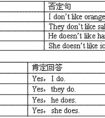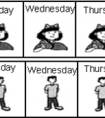I_________ hiking.[ ]A.oftengoB. gooftenC. oftenam-五年级英语
I don’t come here often. 我不常来这儿。
3. usually有时也用于句末,其前不用修饰语。
I’m not late, usually. 我通常不迟到。
I get paid on Fridays usually. 我通常在星期五领工资。
4.seldom 一般不用于句末,除非其前带有only,very等修饰。
We go out very seldom. 我们绝少外出。
I play basketball very seldom indeed. 我很少打篮球。
5. always一般不用于句末,偶尔用于句末,此时它不表法“总是”,而表示“永远”。
I’ll love you always. 我将永远爱你。
另外,有时用于句末是因为句子有所省略的缘故。
Generally they walked together on Sunday, but not always.
他们一般在星期日一起散步,但并不总是如此。
句中的but not always=but they didn’t always walk together on Sunday。
频度副词位于句首的用法:
1. sometimes常可用于句首。
Sometimes she comes late. 有时她来得晚。
Sometimes she didn’t agree with me. 有时她和我意见不一致。
Sometimes we get a lot of rain in August. 有时在8月份雨水很大。
2. often用于句首时,通常表示强调,且其前一般有quite, very修饰。
Very often he comes in late. 他常常迟到。
Quite often the phone rings when I’m in the bath. 电话经常在我洗澡时响。
3.usually有时也用于句首,其前不用修饰语。
Usually I get up early. 我平时起得早。
Sometimes he comes by bus, but usually he comes by taxi.
有时他坐公共汽车来,不过他通常还是打的来。
Usually cooking pots have two small handles but pans have one long handle.
通常地深底煮锅有两只把手而平底锅只有一个长长的把手。
4.always一般不用于句首,除非是用在祈使句中。
Always remember this. 请时刻记住这一点。
Always look in the mirror before starting to drive. 一定要先看看反光镜再开车。
另外,never也可用于祈使句的句首。
Never tell him the news. 千万不要告诉他这消息。
Never ask her about her marriage. 决不要问她结婚的事。
5.在正式文体中,表示否定意义的副词seldom, never可位于句首,但此时其后要用倒装语序。
Seldom has there been such a happy meeting. 过去很少有过这样愉快的会议。
Never did he think the book would be finished so soon. 他可没想到这本书会这么快看完
另外,once a year (每年一次), twice a week (每周两次), three times a day (一天三次), every Saturday afternoon(每星期六下午)等,
这些时间状语也表示频率,它们可以和频度副词用在同一个句子中,表达上没有重复。如:
We usually go to the cinema four times a month. 我们通常一个月看四次电影。
考点名称:实义动词
实义动词:
与系动词是相对的,系动词亦称连系动词,作为系动词,它本身有词义,但不能单独用作谓语,后边必须跟表语(亦称补语),构成系表结构说明主语的状况、性质、特征等情况。
实义动词意思完全,能独立用作谓语。
实义动词有及物动词和不及物动词(及物动词是指后面要求有直接宾语的动词;
不及物动词指后面不需要跟宾语的动词)即行为动词,表示动作的动词。
实义动词(又称行为动词):表示行为或状态,有完全的词义,能独立作谓语。
如:I go to school by bus. 我乘公交车去上学。
The students clean their classroom every day. 学生每天打扫教室。- 及物动词:
后面必须跟宾语,意义才完整的实义动词,叫做及物动词(transitive verb)。
英语中的及物动词有:interest,worry,guss,please,surprise,love等
例如:I believe that the committee will consider our suggestion.我相信委员会将会考虑我们的建议。
“How long can I keep the book ”Harry asked.哈里问:“这本书我可以借多久?”
Dr. Bethune set us a good example. 白求恩大夫给我们树立了好榜样。
Crude oil contains many useful substances.原油含有许多有用的物质。
不及物动词:
本身意义完整,后面不用跟宾语的实义动词,叫做不及物动词(intransitive verb)。
Birds fly.鸟会飞。
It happened in June 1932.这件事发生于一九三二年六月。
My watch stopped.我的表停了。
She spoke at the meeting yesterday evening. 她在昨天晚上的会上发了言。
兼作及物动词和不及物动词:
英语里有不少实义动词可以兼作及物动词和不及物动词。
这样的动词又有两种不同的情况:
a)兼作及物动词和不及物动词时,意义不变。试比较:
Shall I begin at once?我可以立刻开始吗?(begin作不及物动词)
She began working as a librarian after she left school.她毕业后当图书馆管理员。(began作及物动词)
When did they leave Chicago?他们是什么时候离开芝加哥的?(leave 作及物动词)
They left last week. 他们是上周离开的。(left 作不及物动词)
b)兼作及物动词和不及物动词时,有时意义不尽相同。如:
Wash your hands before meals.饭前要洗手。
Does this cloth wash well? 这布经得起洗吗?
与汉语的比较:
有时英语动词的及物和不及物的用法,与汉语的用法完全不一样,请注意下列两种情况:
a)有的动词在英语里只能用作不及物动词,而汉语则可用作及物动词,如arrive到达,agree同意,listen听。英语里这些动词后面常接介词。如:
We arrived at the railway station at noon.我们于中午到达火车站。(at不能省去)(比较:We reached the railway station at noon.)
Everybody listened to the lecture with great interest.每个人都很有兴趣地听讲课。(to不可省去)(比较:We all heard the lecture.)
Do they agree to the plan?他们同意这个计划吗?(to不可以省去)
b)有的动词在英语里能用作及物动词,而在汉语里则不能用作及物动词,如serve为…服务。
Our children are taught to serve the people wholeheartedly.我们的儿童被教以全心全意为人民服务 - 特殊实义动词:
英语动词很多既是及物动词又是不及物动词,如
close, begin, study, leave, work等。
①The post office closes at 9:00 p. m.邮局晚上9点关门。
②Close the window,please.请关窗。
③Shall we begin now?我们现在开始吗?
④ Bill began working as a sailor after he left school.比尔毕业后当水手。
⑤They left yesterday.他们昨天离开的。
⑥When did you leave Washington?你什么时候离开华盛顿的?
⑦The students study hard.这些学生学习努力。
⑧The students study English and German.这些学生学习英语和德语。
⑨He works in a supermarket.他在一家超市工作。
⑩He works the machine on Mondays.他星期一操作这台机器。
- 最新内容
- 相关内容
- 网友推荐
- 图文推荐
上一篇:IwatchTVandplayfootballonSundays.[ ]A. haveB. amC. often-五年级英语
下一篇:________ I climbmountains.[ ]A.SometimeB.SometimesC.sometime-五年级英语
零零教育社区:论坛热帖子
| [家长教育] 孩子为什么会和父母感情疏离? (2019-07-14) |
| [教师分享] 给远方姐姐的一封信 (2018-11-07) |
| [教师分享] 伸缩门 (2018-11-07) |
| [教师分享] 回家乡 (2018-11-07) |
| [教师分享] 是风味也是人间 (2018-11-07) |
| [教师分享] 一句格言的启示 (2018-11-07) |
| [教师分享] 无规矩不成方圆 (2018-11-07) |
| [教师分享] 第十届全国教育名家论坛有感(二) (2018-11-07) |
| [教师分享] 贪玩的小狗 (2018-11-07) |
| [教师分享] 未命名文章 (2018-11-07) |


![I_________ hiking.[ ]A.oftengoB. gooftenC. oftenam-五年级英语](http://www.00-edu.com/d/file/ks/4/1/40/2019-08-19/smalle9a6cc00549ea1d7a9ed730fb2fa1a511566228356.gif)

